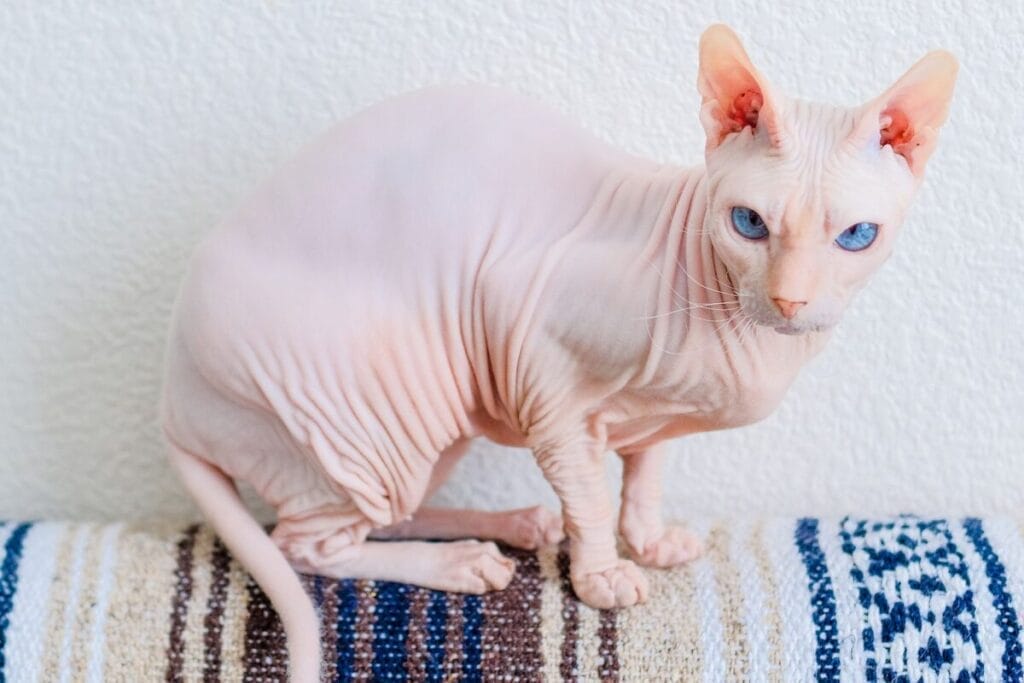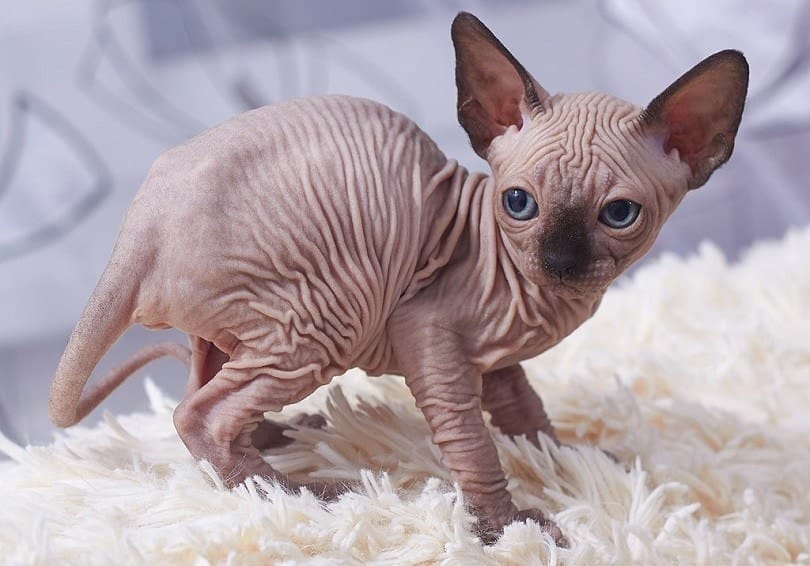The Donskoy originated in Russia in the 1980s after a kitten was born hairless due to a natural genetic mutation. The breed was developed from his offspring and remains scarce worldwide today.
Introduction Donskoy Cat Breed
The Donskoy is an intelligent, affectionate cat with a uniquely wrinkled appearance. They have a medium muscular build but are most known for their lack of fur. Come in patched “flock” coats or completely bald. While their hairless look may seem unusual at first, they are gentle, playful, devoted cats.

Affectionate with Family: ⭐⭐⭐⭐⭐
Amount of Shedding: ⭐
General Health: ⭐⭐
Potential for Playfulness: ⭐⭐⭐⭐
Tendency to Vocalize: ⭐⭐⭐
Kid-Friendly: ⭐⭐⭐⭐
Friendly Toward Strangers: ⭐⭐⭐⭐
Easy to Groom: ⭐⭐⭐⭐⭐
Intelligence: ⭐⭐⭐
Pet Friendly: ⭐⭐⭐
- Appearance: Hairless or sparsely haired, wrinkled skin, lean muscular body
- Characteristics: Intelligent, people-oriented, playful, demands attention
- Popularity: Very rare, ranks amongst lowest in breed popularity
- Temperament: Extremely affectionate, attached to owners, outgoing, social
- Lifespan: 12-14 years
- Coat Color: Completely hairless or flock (sparse patchy hair)
- Breed History: Natural mutation in Russia in 1980s, breed established from hairless kittens
Caring for a Donskoy Cat Breed
Food:
- High-quality dry food. No special diet, but smaller meals better than free feeding
- Canned food added for moisture. Require more fluids due to lack of coat insulation
- Ensure food has taurine, omega fatty acids for skin health
Environment:
- Warm, draft-free home. Vulnerable to cold. Provide sweaters when needed
- Cat trees, scratching posts, toys. Interactive playtime daily
- Sunscreen recommended when spending time in strong sun
Grooming:
- Gently wash wrinkled areas 1-2 times weekly using mild soap, thorough rinsing
- Apply moisturizer after bathing to prevent drying of sensitive skin
- Check skin regularly for signs of injury or irritation
- Trim nails carefully each 1-2 weeks

Take Care of Method:
Interactive playtime daily. Affection and companionship. Monitor skin for injuries, sunburns, or dryness/irritation.
Adopting/Buying a Donskoy
- Locations of Popularity: Russia, parts of Europe, North America
- Average Price: $400 – $800 USD. More from reputable breeders.
- Adoption/Rescue: Check hairless cat rescues. Rare find but sometimes available through shelters/rescue
What to Check Before Adopting/Buying:
- General Health: Active, energetic, healthy body condition. Skin appears smooth, non-irritated.
- Vaccine Status: Up to date on all age-appropriate vaccines. Kittens need boosters.
- Medical History: Review records for past conditions related to skin sensitivities. Responsible breeders do genetic health screening.
Preparing for a Donskoy
Tips for New Donskoy Cat Owners:
- Cat proof your home. Donskoys’ lack of coat makes them prone to scratches, sunburn, dry skin.
- Ensure your home stays sufficiently warm and draft-free. Have sweaters/shirts available.
- Stock up on hypoallergenic moisturizers, sunscreen, gentle soaps for their bathing routine.
- Locate a vet experienced with the unique care of hairless breeds.
- Common Diseases: Skin sensitivities, dental issues. Lack of coat impacts temperature regulation.
- Recommended Vaccines: FVRCP, FeLV, rabies and any others recommended by your vet.

Popular Donskoy Cat Names
- Male Names: Casper, Loki, Jasper, Ollie, Simba, Louie, Smokey
- Female Names: Elsa, Luna, Lola, Abby, Phoebe, Chloe, Sadie
Do Donskoys like going outside rather than staying in?
With their lack of coat, best kept as indoor-only pets. They can still enjoy supervised time in a contained outdoor cat run though.
Are Donskoy cats intelligent?
Yes, clever, playful cats who excel at learning tricks and puzzle toys that provide mental stimulation.
How many types of Donskoy cats are there?
There are two varieties – completely hairless or “flock” coated with sparse patchy fur. Both lack the undercoat common to most cat breeds.
How to stop a Donskoy from biting?
Start training bite inhibition young using rewards like treats and praise for gentle play. Say “no bite” then ignore them briefly if they bite.
How to stop a Donskoy from scratching furniture?
Provide plenty of sturdy scratching posts, vertical scratchers, scratch pads. Reward them for using appropriate scratching surfaces. Use cat-safe deterrent sprays on furniture.
How to socialize and raise a friendly Donskoy?
Gradually expose them to new people, environments, and handling from a young age. Continued positive interactions will help them become more outgoing and affectionate.
How do you train a cat?
Cats are intelligent and respond well to positive reinforcement training using food rewards and praise. Have regular playful training sessions.
How often should a Donskoy see the vet?
Annual check-ups are recommended along with twice yearly senior exams over age 7. Visit anytime skin irregularities are seen. Dental cleanings help prevent gum disease.
Are Donskoys good family pets?
Yes! With their affectionate personality, make wonderful family companions when provided proper care and environmental control.
Are Donskoys good with children?
Yes, when raised with gentle children, most thrive. Always supervise play and teach kids how to properly handle them.
Are Donskoys good with other pets?
Generally coexist well with cat-friendly dogs and other household cats when socialized young and properly introduced.
Can Donskoy cats cause allergies?
While not completely non-allergenic, most people with cat allergies can tolerate much better than furry cats. Their lack of shedding and dander helps minimize reactions.
Are Donskoy cats aggressive?
No, cats are quite gentle, playful and friendly when well-socialized from kittenhood onward. They make sweet, mellow companions.
Do Donskoys have hair loss problems?
No, cat is intentionally bred to be bald or have very sparse hair growth resembling down. Their hairlessness is due to a natural mutation rather than illness.
Are you a cat lover who wants to learn more about your furry friends? Do you want to find the best cat food, cat care tips, and resources for your cats? If so, you’ve come to the right place! Welcome to Cat Food Site, the ultimate website for cat enthusiast.
Here you will find everything you need to know about cats Breed, from their health and behavior to their breeds, cat diet and names. You will also discover the latest cat news, cat nutrition, trends, and memes from around the web.

